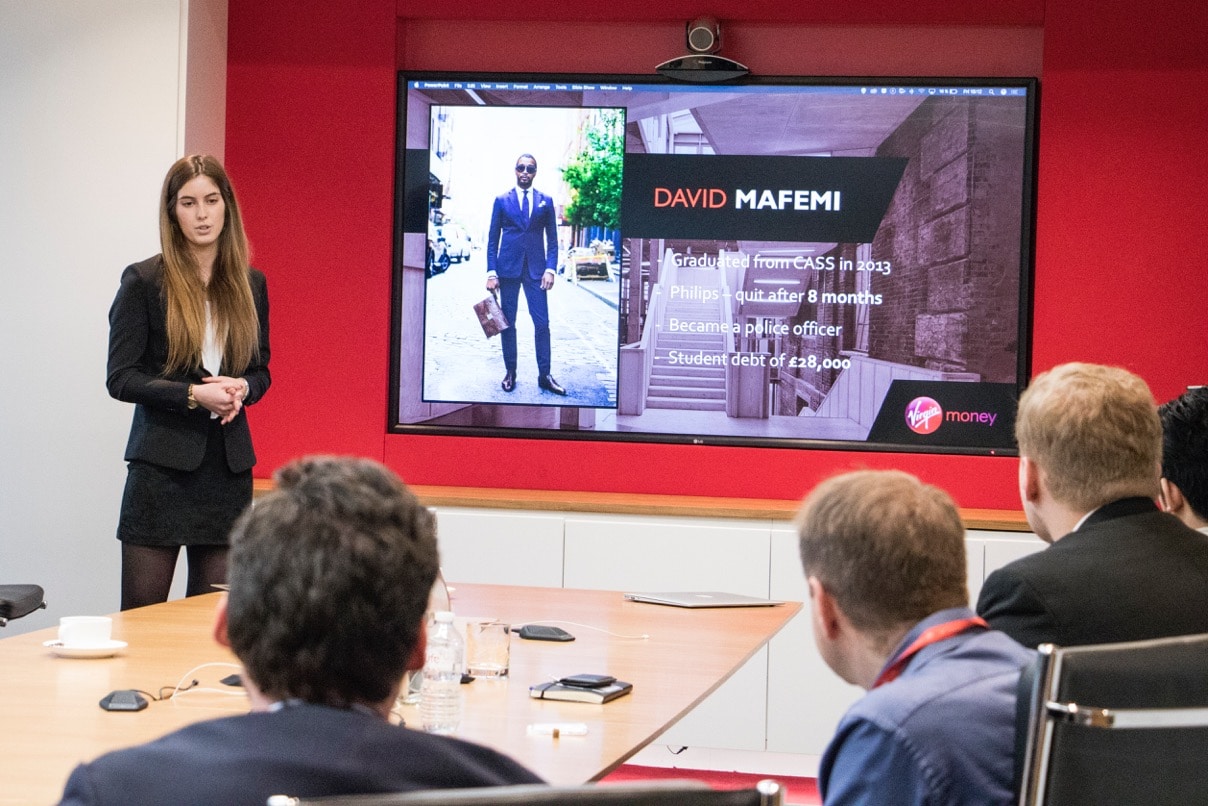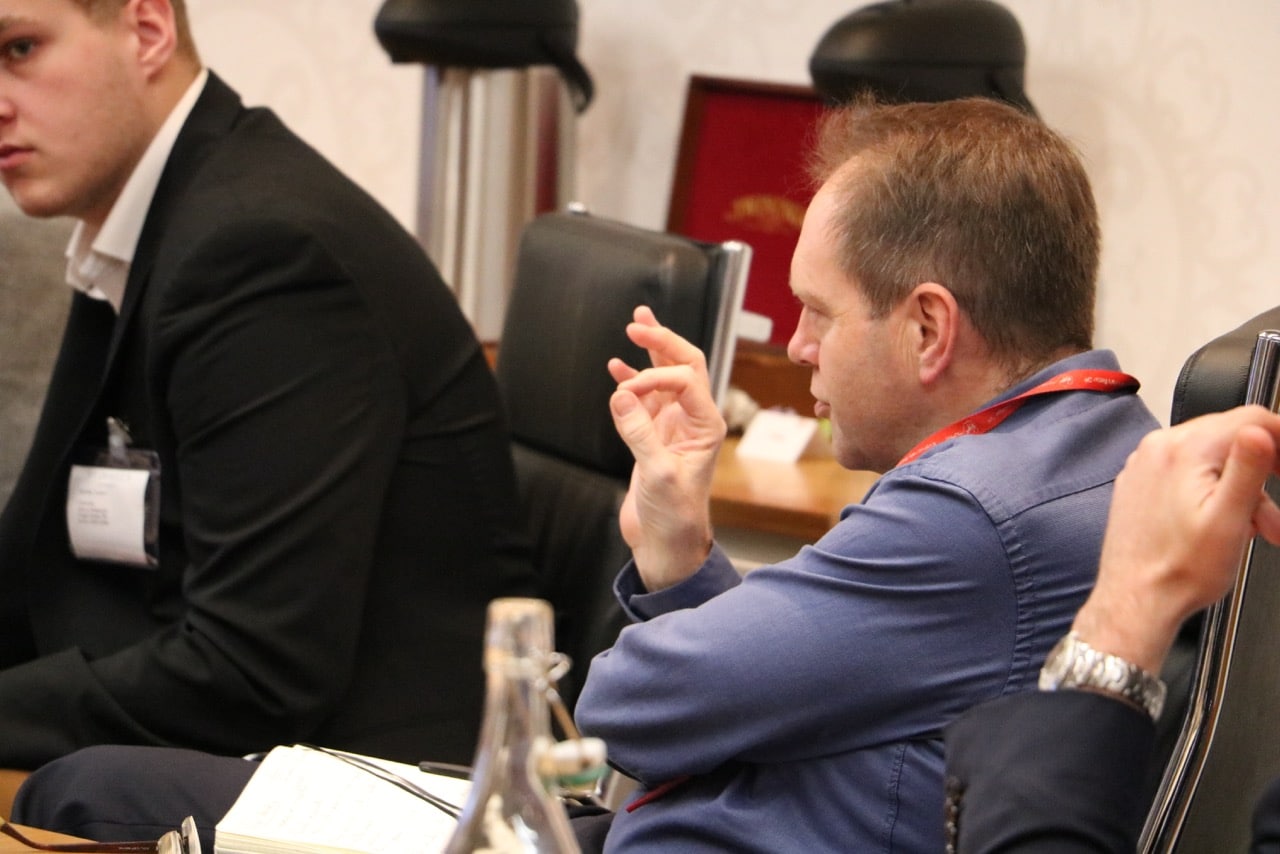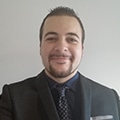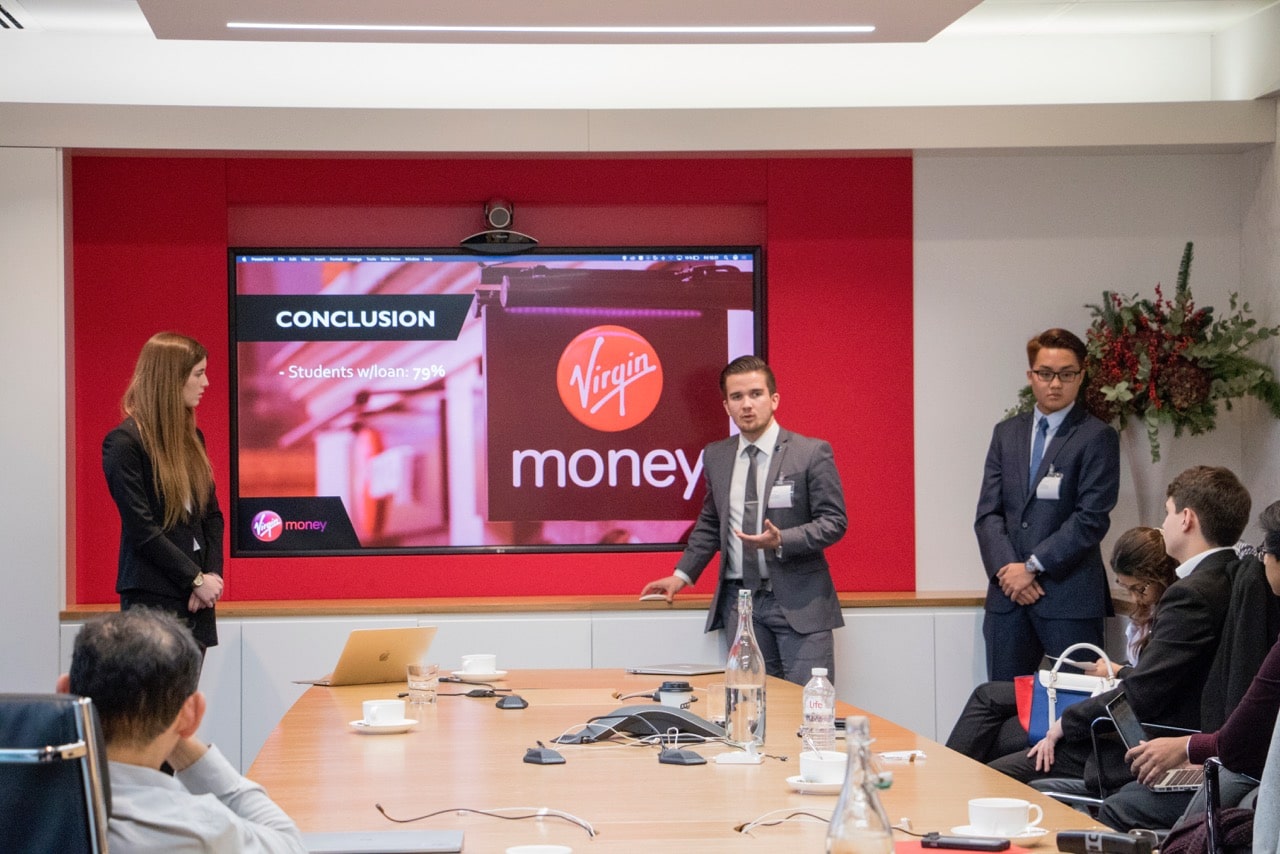The digital banking division of one of Britain’s biggest brands, Virgin Money, is collaborating with Hult students to develop a selection of products that have the potential to disrupt the area of student digital banking.
David Hall, Director of Future Generation Banking at Virgin Money, has been working with Hult’s undergraduate students to innovate a student banking app. And now, David and his team have asked Masters students in the Finance Society to tackle solutions to offering student loans in the U.K. David says of the experience: “It has been a real pleasure working with Hult International Business School and sharing in an impressive response to the corporate challenge we set in the Fall. Both students and staff have genuinely engaged with Virgin and added value to our quest to reinvent what a bank should be. We have been impressed by the innovation, creativity and enthusiasm the team have brought to this strategically important opportunity and expect this to be the first step in a growing cooperation between Virgin and Hult.”
So how did the students themselves find the experience? And what was actually involved? We spoke to two undergraduate students, Claudia Lopez and Thomas Foffano, and Master of International Business student and member of the Finance Society, Mark Ludwig, to find out.
How did you become involved in the project with Virgin Money?
Claudia: I joined this project as a member of the Management Consultancy Club. Having Virgin Money as my first client was surreal and nerve-wracking, but it ended up being the best experience. As a first-year university student, this was an unbelievable opportunity.
Thomas: Virgin Money set the challenge to our Corporate Entrepreneurship class, led by Professor Alessandro Lanteri. The project made us understand and apply everything Corporate Entrepreneurship is about – that being innovative is not just for startups to break through, but also crucial in well-established businesses to stay competitive, finding new ways to solve an issue and come up with a new product or service.
[Tweet “Being innovative is not just for startups, it’s also crucial in well-established businesses”]
Mark: I was approached by Matthieu Poupard, on Hult’s Corporate Relations team who said that Virgin Money were coming to the end of their project with the undergraduates and were looking to collaborate with Hult students on another project. He asked if I thought the Finance Society would be interested, and obviously, I said yes.
How did you work with the team at Virgin Money?
Claudia: We got to meet and talk to the Virgin Money team, work with some of their partners on the technical development of the product, then go to the Virgin Money offices and present to the board. It was amazing being so involved with the Virgin Money leadership team, and an incredible experience to work side-by-side with them on a product that is launching to market.


Mark: Well, we’re still in the middle of the project. But so far, it’s been a very closely collaborative working relationship. Even in terms of how we were going to run the project, we developed the process together.
How did you go about developing the product? What was the process?
Claudia: The first stage was to collect primary data and present it to the Virgin Money team. Then, we prepared our report and a video showing our idea. The best teams were then chosen to work with Virgin Money on the product that would launch this Spring.
Developing the product for launch started with a design sprint, led by Professor Lanteri, in which we had to create a prototype in five days. These five days were very intense and frustrating at times but they were the key to this project and where all of the best ideas came from. Step by step, we brainstormed, we designed, we created prototypes and we even went out to universities to test our product on the possible future client.
“It was amazing being so involved with the Virgin Money team, and an incredible experience to work side-by-side with them on a product that is launching to market.”
Thomas: Timing is crucial, and during a 5-day design sprint, time flies. The first two days we had countless ideas, and having to cut through to determine what the service would eventually feature was a tough set of decisions and compromises.
Even after we settled on our product, we were constantly updating it with new data, from functional difficulties to legal blocks, and we had to relentlessly redefine the App concept accordingly.
Mark: We’re looking into developing student loan products for the U.K. market and trying to find a solution that works for everyone – students, parents, the government. The biggest challenge right now is the fact that we’re trying to compete with a state-sponsored loan system. There’s a lot to consider – it’s a huge challenge.
How do you think working with real companies on real business challenges like this prepares you for the working world?
Claudia: By working with a real company, you not only learn the skills required to do the job but you learn how the company actually works. You get to observe how they think and how their day-to-day is. I believe that the best way to learn a language is to talk to and to be surrounded by people that speak it, and learning about the working world is no different.
“By working with real companies you will learn how to tackle and solve any problems or issues that a book will not teach you.”
By working with real companies you will learn how to tackle and solve any problems or issues that a book will not teach you. It teaches you how to communicate and network with other people as well, which is a very important factor. Knowing how to communicate and how to cope with different situations is as important as knowing the theory behind it.


Thomas: Challenges like this do prepare you for the working world; your employer will come to you with a problem or job, and it’s up to you to do the best you can in the time you have. Also, as I had never met any of my teammates before, it also taught me to perform under pressure with a team of strangers, something all of us will probably be asked to do more than once in our careers.
“The clubs and societies here at Hult make their own relationships with people in the business community, and they do an awful lot with them outside of class.”
Mark: Working on real problems with a real client motivates you and adds to your drive. I’ve learnt so much about how to manage client interactions. I want to go into consulting, so this is the ideal experience for me. The clubs and societies here at Hult give you a lot of opportunities to do things like this – they bring in great speakers, they get involved in projects like this one. The clubs make their own relationships with people in the business community, and they do an awful lot with them outside of class.
Have you discovered anything surprising about your skills or passions through working on the project?
Claudia: I realized how much I would like to be an entrepreneur and launch my own product. I loved all the aspects of the process, from the importance of putting yourself in the customer’s mind and thinking what they would like, to the brainstorming, the thinking of every detail, the design of the product, every button, every line, every shadow – everything matters.
[Tweet “Every button, every line, every shadow, everything matters. “]
Thomas: I could’ve easily missed this opportunity. I remember my team being chosen as part of the finalists to present to Virgin Money at the end of the Corporate Entrepreneurship course and continuing to work on it during the design sprint. I received the email two hours before the finalist presentations, and my two teammates were back home for the weekend. I was reluctant to go and present on my own, especially with no preparation, but I decided to jump in a cab to Virgin Money headquarters and do my best… It’s perhaps the best decision I have taken in my academic life and it taught me an important life lesson: NEVER back down.
To find out more about our undergraduate and graduate programs, download a brochure.




Thomas Foffano is studying for his Bachelor of Business Administration at Hult’s undergraduate campus in London.


Kickstart your career with Hult’s undergraduate business school. To find out more, take a look at our blog Going beyond business: Introducing our undergraduate curriculum. Download a brochure or get in touch today to find out how Hult can help you to learn about the business world, the future, and yourself.


